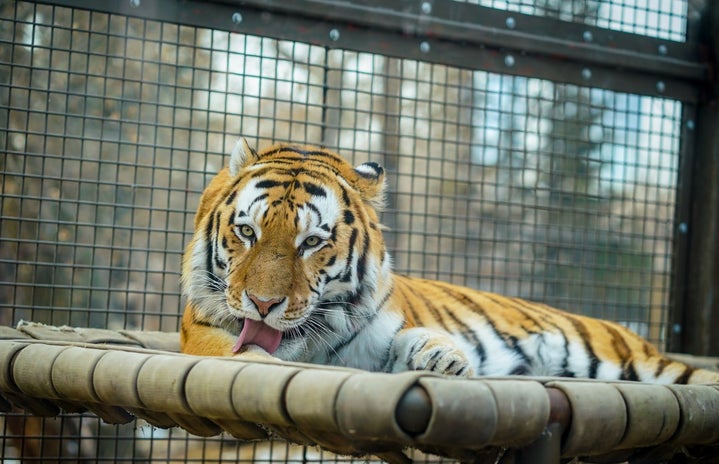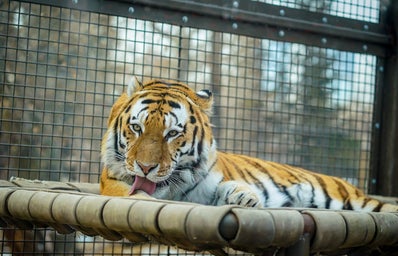Zoos have been a controversial subject for many years, and many zoos have come out and addressed these claims with general statements like the idea that zoos provide inspiration to visitors to compel them to care about the environment more. Whenever this argument is brought up regarding zoos, I cringe – why do we keep pushing the responsibility of caring for animals onto the shoulders of other people? Further, why aren’t these big zoos doing more to protect the animals they claim to care about, rather than making a profit off of exhibiting them? Zoos are unethical and don’t protect animals because they create horrible conditions and lifestyles for animals, don’t actually foster conservation, and maintain harmful human-animal relations that contribute to the crisis of animal extinction that we face today.
Firstly, zoos are not the place where animals are supposed to eat, grow, and live. They are human-made entertainment spaces initially created to make a profit. That’s not a pretty view, but it is the truth. Due to the financial nature of zoos, there are many cases where animals are not properly cared for or are abused by their caretakers. For instance, Indonesia’s zoos are especially known for their lack of care. At Surabaya Zoo, a lion strangled himself to death with a stray cable and a giraffe died with 40 pounds of plastic in his stomach. In fact, only four of the country’s 58 zoos were considered “decent.” On a larger scale, animal mistreatment is common. Zoos belonging to the World Association of Zoos and Aquariums (WAZA) filmed many zoos confining animals to outrageously small areas and beating them. Zoos are breeding grounds for cases of animal mistreatment and lack of care because they were designed with the intention to make a profit, not to protect wildlife. Moreover, animals are impacted by captivity and experience mental health effects. For example, many animals suffer from physical illnesses like arthritis, obesity, and skin problems. This is inevitable in atmospheres where they are confined to unnatural spaces and not given the kind of ecosystem they require. They also suffer from mental illnesses, such as abnormal behaviours like purposeless habits of bobbing their heads. More importantly, neuroscience has shown that living in stressful captive areas physically damages brains, shown through an analysis of stress hormone levels and an observation of behaviours. A thinning of the cerebral cortex occurs, and cortical neurons process information in a much slower and ineffectual way. Although zoos like to say that animals are protected within the gates, the organization of zoos in a human-guided and transaction-based atmosphere creates an environment that allows for mistreatment to occur, and the innate captivity these animals face create detrimental physical and psychological impacts. Just think about the effects of the last year of the pandemic on our own mental health – it doesn’t paint a pretty picture.
Additionally, zoos like to emphasize their ability to conserve the ecosystem. However, zoos actually only reintroduce a small number of animals to the wild. For instance, Damien Aspinall says that only a small number of animals in European zoos were release projects and at least a third of those species weren’t actually threatened. This deconstructs the myth of zoos as “saving” animals and presents the reality of the situation. I do not contend the idea that zoos have and will continue to successfully reintroduce animals to nature. However, I do not think that the mental and physical effects of captivity are warranted for other non-endangered animals in the zoo. Further, when animals are ogled at and looked at by humans for the entire day, it presents a radically different mission than housing them until they are reintroduced to the wild. It becomes more about human entertainment than the animal’s survival.
Most importantly, zoos create harmful animal-human relations that mimic the current anthropocentric exploitation of the earth through global warming, animal extinction, and other natural crises. By keeping animals enclosed in zoos and profiting off of them, we exploit their mental and physical suffering to provide slim entertainment. Zoos are a human-designed world which often leads to issues when animal-human relations occur. For instance, Harambe, a gorilla in the Cincinnati Zoo, was shot after a child climbed into his cage. While we pretend that zoos are a place of animal importance, we foreground the authority of humans. By putting these animals on display, we accept the risks of people coming to harm, and the inevitable outcome of animals being shot or killed. However, if zoos did not exploit their animals in this way, and maintained the ecosystem’s natural order, then the instances for the child’s fall or Harambe’s death would not have occurred at all. As humans, we think it is our right to subjugate animals to our world and entertainment and forget that they rightfully belong to the wild. Until we recognize that animals are not for our own profit or exploitation, we will never move past the exploitative attitudes regarding global warming and animal extinction.
If you truly care about animals, stop supporting zoos. Zoos are a conception of a past that saw wildlife as a way to profit. As we approach an era of reconciliation and apology to nature, we must eradicate the entertainment industry of zoos. They are a relic of a poignant yet horrible past that needs to be removed if we are to ever respect animals and the earth and live in harmony with them.
References:
https://www.nationalgeographic.com/animals/article/wildlife-watch-indonesia-zoos-animal-welfare
https://www.cbsnews.com/news/outrage-after-gorilla-harambe-killed-at-cincinnati-zoo-to-save-child/


